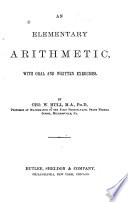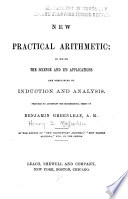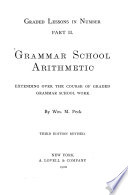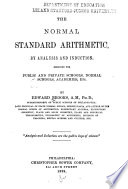 | Oscar F. Williams - Arithmetic - 1894 - 332 pages
...denominator divides the fraction; dividing the denominator multiplies the fraction. 3. Multiplying or dividing both terms of a fraction by the same number does not change the value of the fraction. REDUCTION OF FRACTIONS. 171. To Reduce a Whole Number to a Fractional Form. EXAMPLE.... | |
 | George Washington Hull - Arithmetic - 1894 - 204 pages
...may be done to the terms of a fraction without changing its value ? 49. Principle. — Multiplying or dividing both terms of a fraction by the same number does not change the value of the fraction. 7. How many halves in T\ ? T\? 8. How many thirds in f? T%? 9. How many fifths in... | |
 | Henry B. Maglathlin - 1894 - 370 pages
...fraction. 3. Dividing the numerator or multiplying the denominator divides the fraction. 4. Multiplying or dividing both terms of a fraction by the same number does not change its value. >1 t-ll I ii I 1. If a unit be divided into 4 equal parts, what will be the name or denomination... | |
 | Wm. M. Peck - 1894 - 310 pages
...fraction. n. Dividing the numerator or multiplying the denominator divides the fraction, in. Multiplying or dividing both terms of a fraction by the same number does not change its value. Reduce fff to its lowest terms. Since no common factor can readily be discovered, we find... | |
 | Albert Newton Raub - Arithmetic - 1894 - 200 pages
...to their lowest terms. 13. Reduce ^-f, f$, ^f to their lowest terms. PRINCIPLE. — The division of both terms of a fraction by the same number does not change its value. Thus, if both terms of the fraction Тв2, equal to ^, be divided by-6, the quotient is... | |
 | Edward Brooks - Arithmetic - 1895 - 424 pages
...fraction to lower terms. From the above analysis we derive the following principle : Principle 2. — Dividing both terms of a fraction by the same number does not change the value of the fraction. WRITTEN EXERCISES. 1. Reduce Jfj to fifths. SOLUTION. — Since dividing both terms... | |
 | Education - 1895 - 850 pages
...denominator, which is a multiple of each fraction's denominator. The principle involved is: Multiplying or dividing both terms of a fraction by the same number does not change the value of the fraction. 8. .03?5X.006=T5fg^,=458TOAns. 4. Since there are 640a. in a section, the man bought... | |
 | Charles Edward White - Arithmetic - 1895 - 254 pages
...value. Multiplying both terms of a fraction by the same number does not change its value. (Illustrate.) Dividing both terms of a fraction by the same number does not change its value. (Illustrate.) To reduce a fraction to higher terms, multiply both terms by the same number.... | |
 | Education - 1913 - 608 pages
...Is -j^ more or less than f ? Does it divide the fraction to multiply the denominator? Multiplying or dividing both terms of a fraction by the same number does not change the value of the fraction. * + 2 Can you divide the numerator? What is the new numerator? What is the denominator?... | |
 | United States. Bureau of Naval Personnel - Arithmetic - 1913 - 144 pages
...result will be TV, in •& there are twice as many parts as in f, but they are only half as large. 6. Dividing both terms of a fraction by the same number does not change its value. Thus, if both terms of ^ be divided by 2, the result is f ; in f there are £ as many parts... | |
| |